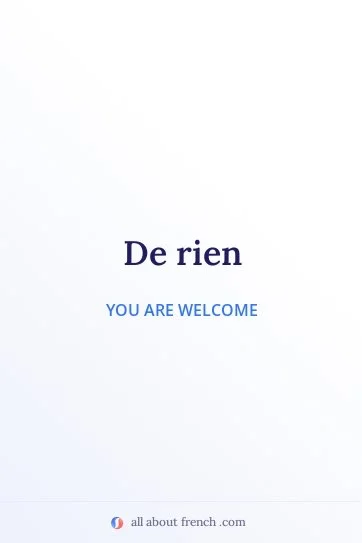
Get ready to find out everything you want to know about the basic sentence "De rien". It includes a complete explanation of what it is and how to use it in a dialogue with an audio example.Additionally, we also added some useful stuff like synonyms, dialogue example, slow pronunciation audio and more!
Translation : You are welcome
Register : Neutral - Basic
Slow
Normal
IPA : / də ʁjɛ̃ /

The literal meaning is:
"De rien" is the most basic way to say in French "You're welcome" or "It was nothing". It's neutral register and works for most situations, but it doesn't express much gratitude compared to other variations.
So, if you have to keep in mind just one expression, it's this one, but as you will see below, there are plenty of other ways to express it.
To sound like a true French you will need to master these variations and use them appropriately depending on context, whom you are talking to and how much you want to be polite.
Let's see a few examples!
A very basic example: you do something for someone and the person says: "Merci" (Thank you). Then you answer: "De rien" (You are welcome) or "Avec plaisir" (My pleasure).
But now let's take the same situation and change it a little. The person who says "Merci" is your boss and you want to show some extra respect, so you can use instead: "Je vous en prie" (Literally: "I beg of you").
Another case: the person is now your sibling/family or a close friend. No need to be formal anymore, right? So you can use instead: "Pas de quoi" (That's nothing) or "T'inquiète" (Don't worry) or "Pas de souci" (No worry).
Finally, imagine you think you don't deserve the "Thank you" or you think the other person is actually the one to thank. In this case you can use an expression to redirect the "Merci" toward the other person.
Examples: "C'est moi qui te remercie" → "No, I am the one who thank you" (Informal) or "C'est moi qui vous remercie" (Formal). Other options would be: "Tout le plaisir est pour moi" → "All the pleasure is for me" (Neutral) or "Merci à toi/vous" → "Thanks to you". (Informal/Formal)
Check the variations below to find the most appropriate ones regarding your situation!
If you are texting someone and want to use a shorter version of "De rien" you can say: "2ri1" because "Deux (2)" sounds exactly like "De" and "Ri-un (1)" sounds like "Rien".
In France, the variations you can use are:
In other French-speaking countries, you can also use:
↓ Example in a story with translation ↓
Finally, let's see an example in a parallel story with slow audio.
Un maître de la drague
A cruising master
10%
The story just started!
Get full access to 365 texts and quizzes, including this one.
 Discover more
Discover more Already a member? Full story and quiz here.
